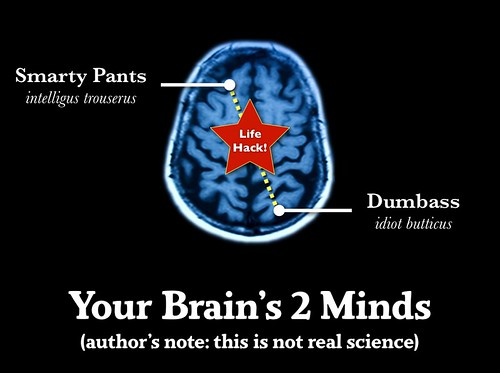Merlin’s weekly podcast with Dan Benjamin. We talk about creativity, independence, and making things you love.
Life hacks: Smarty Pants v. Dumbass
Merlin Mann | Dec 8 2006
The New, Soft Paternalism - New York Times A recent NYT Magazine piece considers the trend toward compulsive gamblers being able to self-ban themselves from casinos and considers the discussions around what this sort of self-imposed "paternalism" might mean. I don't have much of an opinion one way or another about whether this is good, bad, paternalistic, or what have you, but I was struck by a couple paragraphs that go straight to the heart of why many folks seek out garden variety "life hacks" in the first place:
This is a theme I've been thinking about a lot lately; the ways that the "smart" or "correct" or "chaste" part of our mind can potentially help keep the "dumb" or "weak" or "compulsive" part from screwing up; as well as how the dumb part constantly begs help in its way from the smart part, which is then often strangely disinclined to stoop to assistance ("'I' am too intelligent to need help with such things! Just buck up!"). The smarty quietly polishes his monocle and tsk-tsks while the dummy sits and wonders why he's such a basket case. I've started to think that many life hacks, like the gambler's self-ban, represent crude external bridges between these competing factions in our minds. By creating external systems ("put the briefcase in front of the door!") we provide compensatory mental muscles for the "dumb" part of our minds that is the default boss for so much of our day (or at least my day, anyhow). Just a theory, but it might help explain something about the ways many of us struggle to always make the right thing the easy thing (I think that's a Jeff Veen quote), including why we often resist the sort of simple existential heuristics that we're all too happy to install in children, elderly relatives, or developmentally disabled adults, to name just a few. But us? Me? You? Nah, you and me are way too smart for that kind of crap. Right? Sure. Of course, as the article notes, the first person who signed up for the casino ban in Michigan also became the first person to be charged with breaking it. It certainly seems to support the notion that the mind who knows what's best for you ain't communicating particularly efficiently with the part who doesn't (even when both know the consequences of letting the dumb-dumb run things). But, more importantly, you learn that in a head-to-head competition with that thin-limbed, monocle-wearing smarty pants, the musclebound dummy often just wins outright. I like to think that, when applied mindfully, a good life hack can help even the chances for keeping your personal dumbass in line. Or to at least give the smartypants a fighting chance. 34 Comments
POSTED IN:
 One thing that I think...Submitted by Mike-2 (not verified) on December 13, 2006 - 8:35pm.
One thing that I think is missing from this dumbass/smartypants perspective is that the smartypants is the executive part of the brain. It still is the one making a decision, then rationalizing and justifying it. Its not like the dumbass takes control, we're just in the habit of being reactive to many situations. Meditation is good for taking a direct look at this aspect of your mind and our reactions to simple things like itches and little pains are often the most useful for noticing how little impulse control we have. We let our impulses run wild 90% of the time over the smallest details -- how can we expect to tame the mind during the 10% of the day that we think actually matters. That's the real problem: we want impulse control, but only for important things, and that just doesn't work. Mindfulness means being conscious and present with our inner dumbass, and that's how you develop discipline. Its not about supressing your desire for gratification, its about coming face to face with that pain and desire, and then responding to it in a way that's useful. Sometimes that means staying with the painful sensations until they subside, or it can mean choosing to fulfill the need. I don't mean pain that can be dangerous -- a pain can be as something as simple as the desire to scratch an itch. Try to stay with your desire to have relief from an itch for a moment and notice how crazy your mind gets! Its really shocking how little tolerance we have for even tiny amounts of discomfort. Many people try to bribe their mind by saying, "If you endure this discomfort now, you can get a whole lot of comfort later!" But this is counter-productive, because it trains your mind to believe that comfort, whether now or later, is still the most important thing, and soon you will find your mind filled up with fantasies about future or past comforts, or resenting or fearing past or future discomforts. Buddhist meditation is like a mind experiment. Notice the constant tumbling and contortions of your inner dumbass, and how desperately it reacts to even the possibility of pain and pleasure. Don't try to supress it, because that is also a type of reactivity, just stay with the sensations for as long as you can. You will of course get caught up in the reaction and be unable to control it, but that's ok -- as soon as you are able, go back to watching. One book I am reading right now on this topic is called 'Turning the Mind into an Ally', which is good as an introduction, but also has some unique insights that I haven't seen in other books. And here's an interview with the author. » POSTED IN:
|
|
| EXPLORE 43Folders | THE GOOD STUFF |

